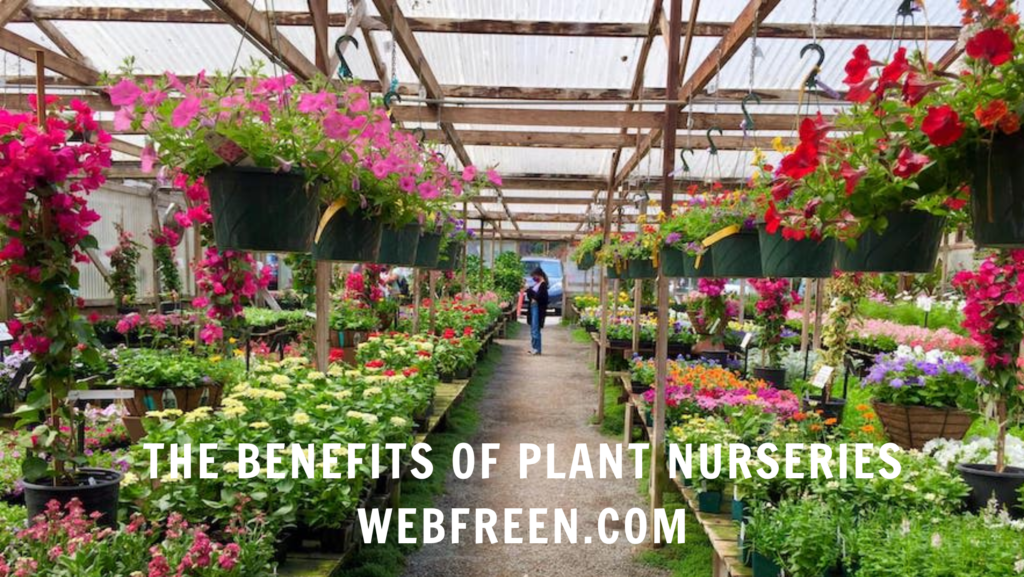Plant nurseries are indispensable in gardening, agriculture, and landscaping, providing a foundation for cultivating healthy plants. Whether you’re a hobbyist gardener or a professional landscaper, understanding the benefits of plant nurseries is crucial. In this article, we at Webfreen.com explore the myriad advantages of plant nurseries and why they are essential for anyone looking to foster greenery in their surroundings.
What Are Plant Nurseries?
Plant nurseries are specialized facilities where plants are propagated, grown, and nurtured until they are ready for transplantation or sale. These establishments can range from small, family-run greenhouses to large-scale commercial operations. Nurseries cater to various plant types, including ornamental plants, fruit trees, vegetables, shrubs, and flowers. By offering optimal growing conditions, nurseries ensure plants are healthy and well-prepared for their next growth stage.
The Economic Benefits of Plant Nurseries
One of the most significant advantages of plant nurseries is their contribution to the economy. They create employment opportunities across various roles, from horticulturists and botanists to workers involved in plant care and sales. Additionally, nurseries support local businesses by supplying plants to landscaping companies, farmers, and retailers. By promoting local plant nurseries, communities can foster economic growth and sustainability.
For gardeners, nurseries offer a cost-effective solution for obtaining plants. Customers can purchase well-established plants ready to thrive in their intended environment rather than investing in seeds, soil, and other resources to grow plants from scratch. This minimizes the risk of failure and reduces the time required for cultivation.
Improved Plant Health and Quality
Plant nurseries are equipped with controlled environments that cater to the specific needs of various plants. From regulated temperature and humidity to nutrient-rich soil and pest management, nurseries ensure that plants grow under optimal conditions. This level of care results in healthier and more robust plants compared to those grown in less controlled settings.
Healthy plants are more likely to survive transplantation and adapt to new environments. Nurseries also conduct regular inspections and disease prevention measures, ensuring customers receive high-quality, pest-free plants. This assurance of quality is invaluable for large-scale agricultural or landscaping projects.
A Diverse Selection of Plants
One of the most appealing aspects of plant nurseries is their wide range of plant varieties. Whether you’re looking for rare ornamental plants, native species, or specific cultivars for agricultural purposes, nurseries are likely to have what you need. Many nurseries also specialize in exotic or hard-to-find plants that may not be available elsewhere.
This diversity allows gardeners and landscapers to experiment with different plant types and designs. Additionally, nursery staff often provide expert advice on selecting the right plants for specific climates, soil types, and purposes. This guidance can be invaluable for ensuring successful gardening and landscaping projects.
Environmental Benefits
Plant nurseries play a crucial role in promoting environmental sustainability. By cultivating plants, nurseries reduce carbon dioxide in the atmosphere and improve air quality. Additionally, they supply plants essential for creating green spaces, which help combat urban heat islands and provide habitats for wildlife.
Many nurseries also focus on sustainable practices, such as water conservation, organic fertilization, and the propagation of native plants. Supporting such nurseries aligns with environmentally friendly initiatives and encourages the growth of eco-conscious businesses. Furthermore, native plants from nurseries require less water and maintenance, making them an excellent choice for sustainable landscaping.
Convenience for Gardeners and Farmers
For both amateur and professional growers, nurseries offer unmatched convenience. Instead of going through the labor-intensive process of germinating seeds and caring for young plants, customers can purchase plants at various stages of maturity. This saves time and effort, especially for those with limited gardening experience or busy schedules.
Farmers benefit significantly from nurseries by obtaining seedlings and saplings already acclimated to local conditions. This reduces the time to harvest and increases crop yields. Additionally, nurseries often sell plants in bulk, providing cost savings for large-scale agricultural operations.

Education and Community Engagement
Plant nurseries are more than just businesses; they are knowledge and community engagement hubs. Many nurseries offer workshops, seminars, and hands-on training sessions to educate the public about gardening techniques, plant care, and sustainable practices. These events create a sense of community and encourage people to embrace gardening as a rewarding hobby.
Nurseries also provide an opportunity for individuals to connect with like-minded enthusiasts. Whether through plant swaps, gardening clubs, or social media groups, nurseries foster a network of individuals passionate about greenery and sustainability. This sense of camaraderie can inspire more people to take up gardening and contribute to greener environments.
Support for Local Ecosystems
Native plant nurseries, in particular, play a vital role in preserving and supporting local ecosystems. Native plants are adapted to the local climate, soil, and wildlife, making them an essential component of ecological balance. By propagating and distributing these plants, nurseries help prevent the spread of invasive species and encourage biodiversity.
Additionally, nurseries often collaborate with conservation organizations to restore natural habitats and protect endangered plant species. Purchasing plants from such nurseries directly contributes to these conservation efforts and ensures the longevity of local ecosystems.
Customization and Personalization
Another benefit of plant nurseries is their ability to cater to specific needs and preferences. Whether you’re designing a backyard garden, planning a large-scale landscape, or creating an indoor plant collection, nurseries can provide tailored recommendations and solutions. Many nurseries also offer custom orders for unique projects, ensuring customers receive the needed plants.
Some nurseries even provide additional services like soil testing, landscape design consultations, and on-site planting assistance. These personalized offerings make nurseries a one-stop solution for all gardening and landscaping requirements.
Reducing Gardening Challenges
Gardening can be daunting, especially for beginners. Plant nurseries simplify this process by providing pre-grown plants, detailed care instructions, and expert advice. By addressing common challenges such as poor germination, pest infestations, and nutrient deficiencies, nurseries empower individuals to succeed in their gardening endeavors.
The nursery staff’s guidance can also help prevent costly mistakes, such as choosing incompatible plants or neglecting proper planting techniques. Thus, nurseries are an invaluable resource for creating a thriving garden or landscape.
Conclusion
Plant nurseries are essential pillars of gardening, agriculture, and environmental sustainability. They offer numerous benefits, from providing healthy, high-quality plants to supporting local economies and ecosystems. Gardeners and landscapers can save time, reduce challenges, and create beautiful, thriving green spaces by choosing plants from nurseries.
At Webfreen.com, we believe that supporting plant nurseries is a step toward a greener, healthier planet. Whether you’re a seasoned gardener or a curious beginner, visiting your local nursery is an opportunity to explore the wonders of nature and contribute to sustainable living. Embrace the benefits of plant nurseries webfreen.com today and witness the transformative power of plants in your surroundings.

